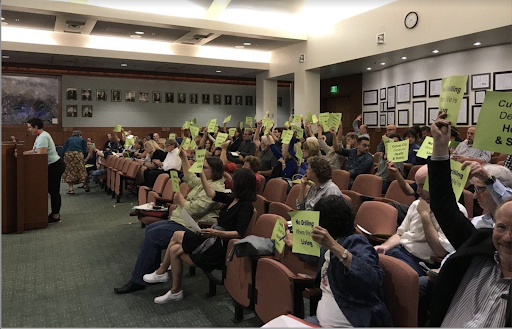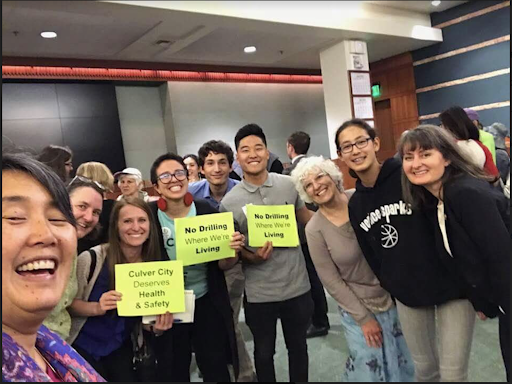December 5, 2022
Culver City, a little city with just a little under 40,000 people – has set a historic precedent for the wider Los Angeles area. As of this November, Culver City voted 4-0 to move forward with a settlement framework with Sentinel Peak Resources that would begin the process of phasing out – and cleaning up – existing oil wells by the end of 2029.
This is no small feat, and Culver City is the first city in recent history to phase out oil drilling. This laid the groundwork for LA County and LA City to do the same. So while Culver City only has 40 wells within its bounds, this precedent will lead to the phase out and clean up of thousands of wells next to homes, schools, and sensitive communities.
And of course, none of this would have been possible without our very own volunteers, who noticed the massive oil field in their backyard and did something about it.
We wanted to hear from the people who made it all happen:
I am incredibly fortunate and extremely grateful to have been part of an amazing community of committed activists and courageous elected officials who stood up to the oil industry and acted to protect our public health and safety by finding a way to phase out oil operations in Culver City. It is especially gratifying to see that Culver City’s leadership in creating this legally sound phase out paradigm has led to similar decisions in Los Angeles County and the City of Los Angeles that will benefit millions of people. Together, we reject the fundamental unfairness of allowing the oil industry to continue to profit by polluting our air, our water, our land, our families, and our planet.
– David Haake Chair, Clean Break, Angeles Chapter, Sierra Club

I joined organizing efforts focused on the Inglewood Oil Field over a decade ago as a resident and concerned mom. As I grew from community organizing to becoming Culver City’s Mayor, the persistent, bold work of grassroots organizers at the Sierra Club and our coalition partners made the impossible possible: together we stopped all new drilling and are phasing out existing drilling in the largest oil field in the US. Building community power and forging a strong inside-outside strategy is how we win. And we know the fight is far from over: implementation of a just transition for workers, full remediation of the field to its natural state, and equity-centered community planning are essential, and remain to be won. Our Sierra Club team is on it!
— Meghan Sahli-Wells, National Sierra Club Board Secretary & former Culver City Mayor

Ten years ago I walked into the Culver City Council chambers for the first time for a presentation on the protections in place at the Inglewood Oil Field. Shortly thereafter I met David Haake and was brought up to speed on the resident lead effort to pass stronger regulations on the field and/or cease operations. In the next 4 years I would work with activists and organizers in Culver City and elsewhere to encourage the council to prioritize people and the climate crisis over fossil fuel profits.
At a certain point it became clear that current council members were unwilling or unable to make the right decision. My campaign for city council was birthed out of a belief that we can and should do more. The election in 2018 was a watershed moment for Culver City politics across a variety of issues. But, it was this people centered work that propelled me to victory and showed Culver City and LA County that transitioning away from fossil fuels is not only possible but wildly popular. Volunteers such as David Haake, Michelle Weiner, Suzanne DeBenedittis, Shannon Theus and a host of others are responsible for this victory. I am honored to have been in a position to make the final vote.
— Dr. Daniel Lee, Mayor of Culver City

Damon Nagomi (NRDC), Kaela Thomas (Black Women for Wellness), Josiah Edwards (Sunrise LA), Supervisor Holly Mitchell and David Haake after a panel discussion on the need to phase out the Inglewood Oil Field at the Pan African Film Festival. (April 2022)
I represent the neighborhood of Raintree, the gated community of over 1,000 souls who live a stone's throw from the Inglewood Oil Field. Like several of my neighbors, I am also a cancer survivor. Many of my neighbors have not been as lucky as I am and succumbed to cancer. Was my/their cancer caused by oil field toxins? No one knows for sure, but the incidence of cancer and the types of cancer we have suffered from may be linked to oil field chemicals.
While we understand that Sentinel Peak Resources (SPR) has the right to survive financially as an entity, we as residents also have a right to breathe clean air without the smell and dangers of gas permeating our space. Phasing out of the Inglewood Oil Field represents hope and a future for all of us and the environment.
— Deborah Weinrauch, volunteer
The challenge to secure a just and sustainable world can seem overwhelming, even to elected officials. Phasing out oil drilling in Culver City offers a glimmer of hope and it’s all because of the sustained and committed work of grassroots volunteers. Local elected officials cannot implement transformative, pro-climate policies without significant community organizing work like what Sierra Club has sustained here. Without grassroots support to educate and correct the record, disinformation—often deliberately spread by entrenched and powerful interests—rules the local media and political landscape.
— Alex Fisch, City Councilmember of Culver City
Header photo: Inglewood Oil Field by Peter Bennett The 1200-acre Inglewood Oil Field located in the Baldwin Hills area is the largest urban oil field in the United States and is surrounded by over 300 homes in the communities of Culver City, Baldwin Hills, Inglewood and Los Angeles. Plains Exploration and Production Co.(PXP), the owner and operator of the oil field, has recently begun the controversial practive of Fracking. Hydraulic Fracturing, or Fracking, is a drilling practice involving pumping of immense quantities of water, chemicals and sand into the ground at very high pressure to break or fissure rock formations in the hope to access hidden pockets of oil and gas. Los Angeles, California, USA
